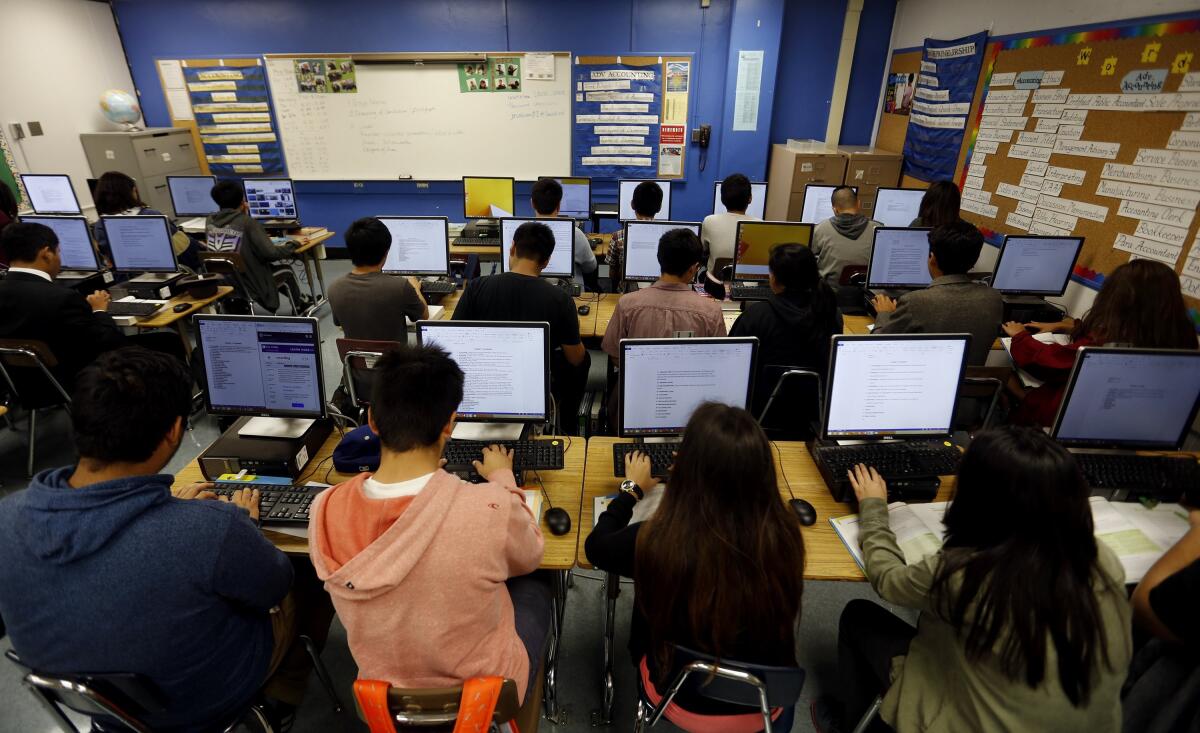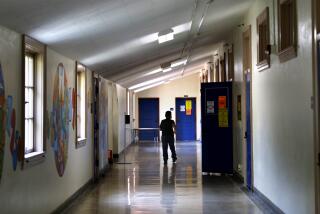Editorial: Would starting school later in the day actually help teens? Let’s find out before making a rash decision

Puberty does weird things to kids. Many of those effects are well understood, but what’s less widely known is that the body’s sleep rhythms change, leading teens to nod off a couple of hours later at night. Add early school start times to that, and the average teen isn’t getting the eight-plus hours of sleep that doctors recommend.
Research shows that well-rested teens are less likely to be depressed, to abuse drugs or alcohol or to crash the cars they drive. They’re also less likely to be tardy to school. No wonder interest is growing across the nation in pushing schools to start later, a concept that’s been endorsed by the American Academy of Pediatrics and the U.S. Centers for Disease Control and Prevention. And nowhere is this interest being manifested in a bigger way than in California, where a bill on the governor’s desk would require middle schools to start no earlier than 8 a.m. and high schools no earlier than 8:30 a.m.
Senate Bill 328 would make California the only state to mandate later school start times.
And here’s why others have wisely been proceeding at a more cautious pace, commissioning studies and pilot programs instead of mandating large-scale change: According to the legislative staff analysis of SB 328, though the benefits of adequate sleep are well established, it’s less clear whether later school start times accomplish anything close to what’s touted.
Perhaps the biggest question is whether later school starts actually result in more sleep. One study indicated that it might make a significant but not dramatic difference — maybe 15 or 20 minutes per night. Another study found that for each half-hour the start of school was delayed, students would get 11 more minutes of sleep, so starting an hour later would add up to just 22 extra minutes of sleep. A third found that though students got significantly more sleep the first year of a schedule change, they simply went to bed later the second year and were back to sleep deprivation.
Research also is mixed on whether later school times improve academic performance over the long term or increase attendance and graduation rates.
“More longitudinal research is needed to study if initial improvements persist,” the analysis says. “Nearly every article related to school start times and adolescent sleep patterns includes a recommendation for additional research on this subject.”
The state’s teachers, parents and students deserve to have better information about whether later school times work before school schedules are disrupted across the state. According to the legislative analysis, elementary schools would probably have to start classes earlier so that district buses would be freed up for the later middle- and high-school trips. Those schools would finish earlier too, meaning many kids with working parents would have to spend more hours in after-school programs.
And because of their work schedules, not all parents would be able to take their kids to school at a later time. That means students would be dropped at school early, losing out on the extra sleep they might have gotten, while their schools would have to hire staff to supervise them. The analysis suggests that this might hit dual-income and single-parent families especially hard.
Meanwhile, according to CDC figures from 2011-12, close to 70% of California’s middle and high schools already start at 8 a.m. or later, though only a fifth start at 8:30 or later. Though separate figures aren’t available for the two kinds of schools, the numbers indicate that most of these students would get a half-hour later start time at most. In addition, some of the earlier start times could include zero periods for elective courses — which would be allowed to continue under the SB 382.
Only one state — New Jersey — has passed a law to start a pilot project so that it can study the issue closely. California should do the same, offering incentives to a handful of school districts that are interested in changing their schedules. It could reward the San Diego Unified School District, which plans to implement a switch to anywhere from 8:35 a.m. to 9:05 a.m. for high schools next year, by funding well-conducted, long-term studies of the results. The staggered start times in San Diego would also provide an opportunity to see whether there’s a big difference between starting classes at 8:35 and starting a half-hour later.
If later school starts would bring significant gains in learning, or in the mental and physical health of the state’s teenagers, the potential inconvenience shouldn’t stop California from climbing on board. But the evidence is too murky at this point to create this much disruption and strip local school districts of the ability to set their own schedules in ways that might work well for their students and parents.
More to Read
A cure for the common opinion
Get thought-provoking perspectives with our weekly newsletter.
You may occasionally receive promotional content from the Los Angeles Times.






